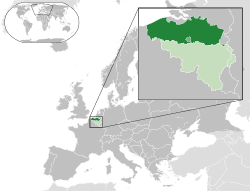De Vlaamse Leeuw
De Vlaamse Leeuw (Dutch: [də ˈvlaːmsə ˈleːu] (![]()
| English: The Flemish Lion | |
|---|---|
Regional anthem of | |
| Lyrics | Hippoliet Van Peene, 1847 |
| Music | Karel Miry |
| Adopted | 1973 |
| Audio sample | |
De Vlaamse Leeuw (Instrumental)
| |
Composition
The words of this anthem were written in July 1847 by Hippoliet Van Peene (1811–1864) who was clearly inspired by the song Sie sollen ihn nicht haben, / den freien Deutschen Rhein, / So lang sich Herzen laben / An seinem Feuerwein (They must never get our free German Rhine, As long as hearts relish its fiery wine) by the German author Nikolaus Becker.
The music, by Karel Miry (1823–1899), is apparently influenced by Robert Schumann's Sonntags am Rhein.
Like France's Marseillaise, De Vlaamse Leeuw is a nationalist battle song. Franco-Belgian political tension in the mid-19th century made the Flemish public mood ripe for such an expression of regional feeling. At the time it was not meant as anti-Belgian (as it often came to be seen by Flemish separatists and their Belgicist opponents), for the 'enemy' it refers to is Belgium's southwestern neighbour France, as in the 1302 Battle of the Golden Spurs.
Around 1900 the anthem was in general use among Flemish militants.
On 6 July 1973, a decree by the then Cultuurraad voor de Nederlandse Cultuurgemeenschap (the precursor of the present Flemish Parliament) proclaimed the first two stanzas to be the official national anthem of Flanders. The text and musical notation were officially published on 11 July 1985.
Lyrics
| Dutch | English translation |
|---|---|
Zij zullen hem niet temmen, de fiere Vlaamse Leeuw, |
They will never tame him, the proud Flemish Lion, |
See also
- De Leeuw van Vlaanderen (The Lion of Flanders, synonymous title, but also the nickname of its hero, the medieval Count Robert III of Flanders and the title of the Flemish national epic by Hendrik Conscience).
- Flag of Flanders, featuring a lion
- Le Chant des Wallons
- La Brabançonne
Sources and external links
- The Regional Government of Flanders has a page with information on the anthem, including a vocal recording (Dutch)
